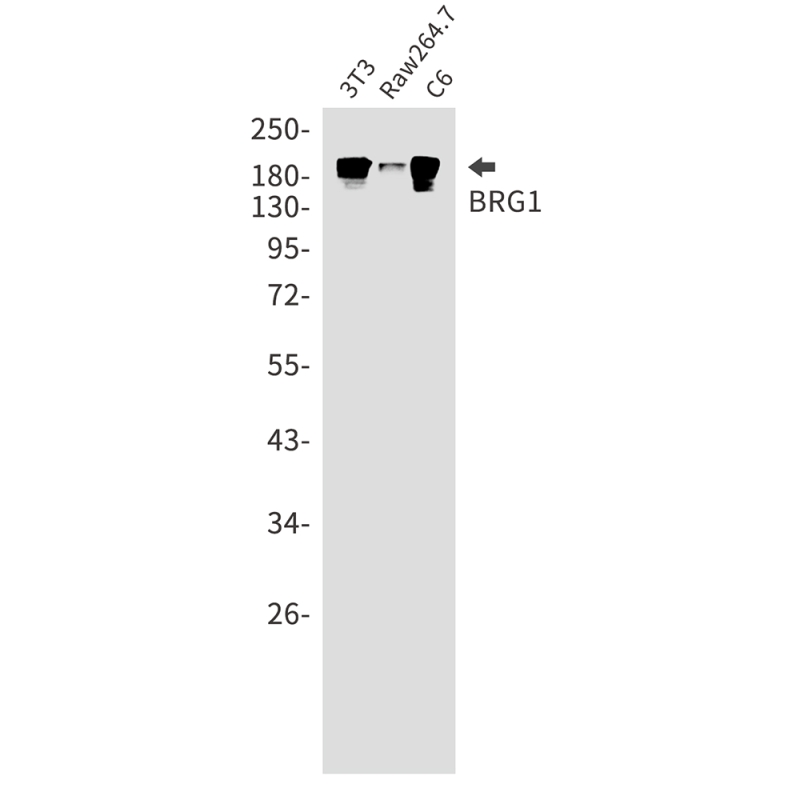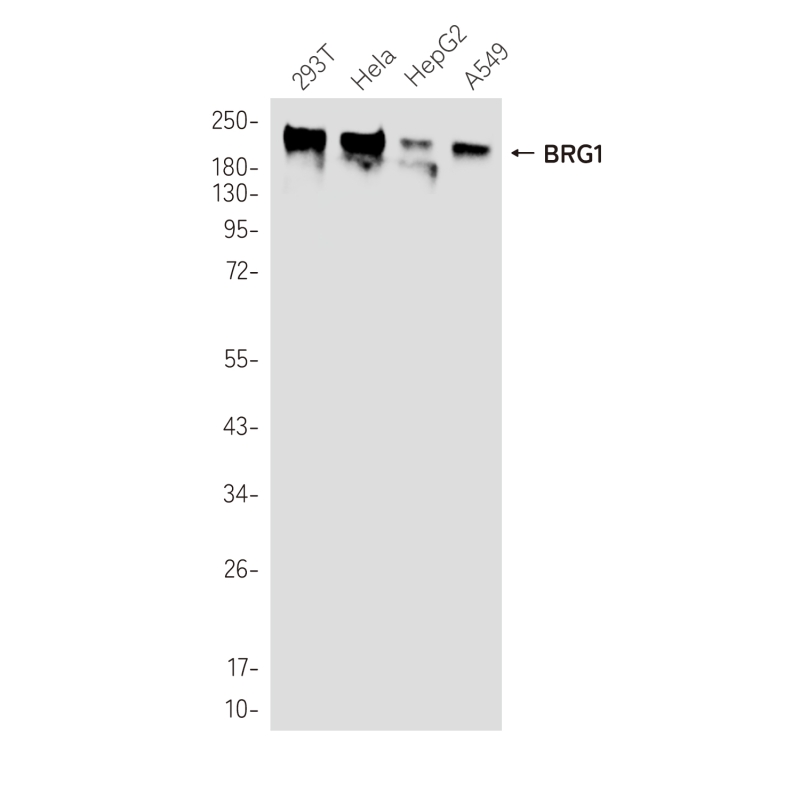

| WB | 咨询技术 | Human,Mouse,Rat |
| IF | 1/20 | Human,Mouse,Rat |
| IHC | 1/50-1/100 | Human,Mouse,Rat |
| ICC | 1/50-1/200 | Human,Mouse,Rat |
| FCM | 咨询技术 | Human,Mouse,Rat |
| Elisa | 咨询技术 | Human,Mouse,Rat |
| Aliases | Brg1; BAF190A; SW1/SNF; HP1-BP72; SNF2beta; b2b692Clo; b2b508.1Clo |
| Entrez GeneID | 20586 |
| WB Predicted band size | Calculated MW: 181 kDa; Observed MW: 220 kDa |
| Host/Isotype | Rabbit IgG |
| Antibody Type | Primary antibody |
| Storage | Store at 4°C short term. Aliquot and store at -20°C long term. Avoid freeze/thaw cycles. |
| Species Reactivity | Human,Mouse,Rat |
| Immunogen | A synthetic peptide of mouse BRG1 |
| Formulation | Purified antibody in TBS with 0.05% sodium azide,0.05%BSA and 50% glycerol. |
+ +
以下是3篇关于BRG1抗体的参考文献及其摘要概括:
---
1. **文献名称**:*"BRG1 expression is increased in human non-small cell lung cancer and correlates with poor prognosis"*
**作者**:Wang X, et al.
**摘要**:该研究通过免疫组化(使用BRG1特异性抗体)分析了非小细胞肺癌(NSCLC)患者肿瘤组织中BRG1蛋白的表达水平,发现BRG1高表达与患者生存期缩短显著相关,提示其可能作为NSCLC的预后标志物。
---
2. **文献名称**:*"BRG1 regulates chromatin remodeling to control transcriptional programs in mouse embryonic stem cells"*
**作者**:Ho L, et al.
**摘要**:研究利用BRG1抗体进行染色质免疫沉淀测序(ChIP-seq),揭示了BRG1通过SWI/SNF复合体介导的染色质重塑在小鼠胚胎干细胞多能性维持和分化调控中的关键作用。
---
3. **文献名称**:*"Targeted deletion of BRG1 impairs tumor growth in a mouse model of hepatocellular carcinoma"*
**作者**:Li M, et al.
**摘要**:通过构建BRG1条件性敲除小鼠模型,结合Western blot(使用BRG1抗体验证敲除效率),发现BRG1缺失显著抑制肝癌细胞的增殖和肿瘤形成,表明其作为潜在治疗靶点的价值。
---
4. **文献名称**:*"BRG1 interacts with YAP/TAZ to promote pancreatic cancer progression"*
**作者**:Liu J, et al.
**摘要**:该研究通过免疫共沉淀(Co-IP,使用BRG1抗体)和功能实验,揭示了BRG1与YAP/TAZ信号通路的相互作用在胰腺癌侵袭转移中的调控机制,为靶向治疗提供新思路。
---
以上文献涵盖了BRG1在癌症、干细胞及分子机制中的研究,均涉及BRG1抗体的实验应用(如免疫组化、Western blot、ChIP-seq等)。如需具体年份或期刊信息可进一步补充。
BRG1 (Brahma-related gene 1), encoded by the *SMARCA4* gene, is a core ATPase subunit of the SWI/SNF chromatin remodeling complex. This evolutionarily conserved complex regulates gene expression by altering chromatin structure through ATP-dependent nucleosome repositioning, enabling access to transcription factors. BRG1 plays critical roles in cellular processes, including differentiation, proliferation, DNA repair, and tumor suppression. Dysregulation of BRG1 is implicated in cancers (e.g., lung, ovarian, and malignant rhabdoid tumors), where its loss or mutation correlates with aggressive phenotypes and poor prognosis.
BRG1-specific antibodies are essential tools for studying its expression, localization, and functional interactions. They are widely used in techniques like Western blotting, immunohistochemistry (IHC), immunofluorescence (IF), and chromatin immunoprecipitation (ChIP-seq) to assess BRG1 protein levels in tissues or cell lines, map its genomic binding sites, and explore its role in chromatin remodeling. Commercially available antibodies target epitopes in conserved regions, though validation is crucial due to potential cross-reactivity with homologous proteins like BRM (SMARCA2). In research, BRG1 antibodies help dissect mechanisms underlying developmental disorders, cancer progression, and SWI/SNF-related synthetic lethality, supporting therapeutic discovery. Their application also extends to diagnostic pathology, where BRG1 loss serves as a biomarker for specific malignancies.
×